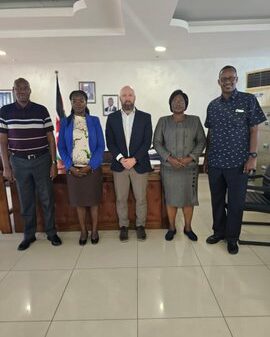NAIROBI, Kenya, Oct 28 – ”l would rather work as a house help in Kenya than travel to the middle East in search for greener pastures,” Saida, not her real name, narrates of her torturous years in the Middle East.
Saida hails from the county of Mombasa, she dropped out of school in Class Seven after becoming pregnant. She therefore ended up becoming a stay at home teen mother with no experience in bringing up a new born.
When her baby turned six months, she began accompanying her parents to peoples’ farms to do menial jobs to supplement their meager pay. One Sunday afternoon when she was lulling her baby to sleep, a friend paid her a visit with what Saida tells me was the best news she’d ever received.
“I was informed of an opportunity to travel to the Saudi Arabia where jobs await people like me. Your guess is as good as mine. I did not hesitate to the opportunity’’.
Saida’s friend had informed her of available opportunities for domestic workers in the Middle East.
She concluded her friend was Godsent. Saida called her parents for a meeting after they came back from church and gave them the good news. The only predicament would be how they were going to raise money to secure the required travel documents.
She started working overtime to raise funds to help realize her dream to travel abroad for work. Her parents worked extra hard to see their daughter leave Kenya for the Middle East. With the little savings she had made, her aunt boosted her financially and finally she was on a flight to Saudi Arabia.
On arrival the second born in a family of seven was received by her new employer whom she described as an introvert. After introduction the two left for what would be Saida’s work station about 200km from the airport.
She surrendered all her essential documents upon enquiring she was told it was a requirement for any foreigner coming to work in the country. She worked hard knowing she had left a young one back in Kenya with her parents. Four months down the line however, all hell broke loose.
She was committed to working until very late at night. She hardly ate and her salary was not forthcoming.
Upon enquiry why she was ill-treated the family told her they paid huge sums of money to secure her so she was their slave. She stayed with the family for one year this time strategizing on her exit plan. Despite difficulties back home she was ready to make the move.
Through the intervention of a family in Bahrain where her friend worked, Saida finally left her masters’ house and came back to Kenya with nothing to show apart from wounds she sustained while in the Middle East.
”Is this really humane? Look at my arms these marks are a constant reminder of the beatings l received while in the middle east,” she narrates, her eyes welled in tears.
Saida is one of the many young girls who leave Kenya in search for employment opportunities in the Middle East only to return back home with nothing to show for their laborious stay abroad.
Reports of East African nationals being raped and tortured and haunting videos of women from across the region pleading for help following mistreatment by their employers saw the Kenyan government follow other countries such as Indonesia and the Philippines in banning its citizens from travelling to work in the Gulf in 2014.
In Kenya 42 per cent of the population lives below the poverty line and many women are prepared to risk abuse to send their desperately needed salary home.
It is because of the harrowing stories, such as Saida’s and reading about modern day slavery that rights activist Mandy Gupta decided to complement government efforts by helping vulnerable girls susceptible to exploitation.
Her initiative ‘My Body belongs to me’ birthed two years ago champions the rights of girls, the slogan serving as a reminder that young girls are born free and that no one has a right to exploit them because of their sex, religion, poverty level or race.
Gupta knew this was not going to be an easy path for her havingspent 17 years in the Middle East in the corporate world.
Gupta narrates how many young people are duped into embarking on perilous journeys abroad in search for greener pastures. “Ghost jobs formulated to entice unsuspecting youths,” she says.
Many agencies woo the youth who are jobless with promises that once they submit their documents and commit a certain fee to them, lucrative jobs abroad await them, she continues, only to end up as slaves and commodities put up for sale in foreign countries.
”It is appalling that in this century we are regressing instead of advancing in terms of human dignity. She muses. My aim is to create awareness and advocacy to the youth on the importance of carrying out a thorough background check before embarking on a job promised abroad because once you cross the borders outside your country of origin you become vulnerable. ”
She warns especially the youth who are susceptible to these empty promises of better jobs abroad to report any suspicious agencies wooing them in order to save lives of other unsuspecting young people.
Other than slavery reports that have been documented she says, organ harvesting and prostitution has lately been on the rise around the world.
In 2010, Kenya passed the Counter-Trafficking in Persons Act which criminalizes human trafficking.
Gupta says she believes in one on one communication where she visits schools, colleges and slums to create awareness that the vice is happening and alive in our society. She does this by organizing workshops that educate the youth through art and music which she finds very effective.
”I am not opposed to boardroom meetings and conferences she confesses, but when will these people meet the young man and woman in the slums to speak to them?” she asks. “That is why l decided to take a different path of doing things and do a meet the people workshops and campaigns”.
Children Development Legal Aid Foundation, a local nongovernmental organization, that partners with ‘My body belongs to me’ has been vibrant in providing legal aid where necessary. Gupta is however calling upon institutions such as churches, schools and colleges to come up and speak against modern day slavery.
She plans to extend her advocacy to Mombasa in the coastal region where she notes the youth are prone to these unscrupulous people ready to prey on unsuspecting young men and women who hunger for a better future across the borders.


































